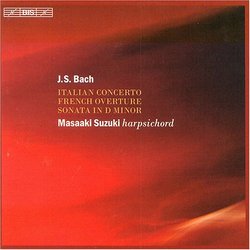| All Artists: Johann Sebastian Bach, Masaaki Suzuki Title: Bach: Italian Concerto; French Overture; Sonata in D Minor Members Wishing: 0 Total Copies: 0 Label: Bis Original Release Date: 1/1/2006 Re-Release Date: 6/27/2006 Album Type: Import Genre: Classical Styles: Chamber Music, Forms & Genres, Concertos, Sonatas, Suites, Historical Periods, Baroque (c.1600-1750), Classical (c.1770-1830) Number of Discs: 1 SwapaCD Credits: 1 UPCs: 675754918927, 7318590014691 |
Search - Johann Sebastian Bach, Masaaki Suzuki :: Bach: Italian Concerto; French Overture; Sonata in D Minor
 | Johann Sebastian Bach, Masaaki Suzuki Bach: Italian Concerto; French Overture; Sonata in D Minor Genre: Classical
|
Larger Image |
CD Details |
CD ReviewsEqual ultimacy of the One and the Many Christopher Witmer | 07/07/2006 (5 out of 5 stars) "I am still in the process of digesting this CD. I have listened to it twice, and since I'm not particularly well educated musically, it will probably take me many more listenings to understand some of the salient features of this performance. I have five or six recordings of just about all the pieces on this CD, played on harpsichord or piano, and although I can -- or perhaps now that I have heard this disc I should change that to the past tense "could" -- enjoy listening to any of them, none of them give the profound satisfaction that this recording does. The sound of the harpsichord (a copy of an expanded Ruckers double keyboard instrument) is wonderful, and there is nothing to complain about with the recording, so a few quick observations about Suzuki's performance. Perhaps Suzuki's playing is best described as "expository." If you want playing that helps you to *understand* these pieces, I think it would be hard to top Suzuki's playing here. He seems to play every single note with more care and control than I have encountered in any other recording. And the "big picture" comes through very clearly as well. So what you have in this playing is an equal emphasis on "the One" (the big picture) and "the Many" (each tiny part) -- something which strikes me as essential to presenting Bach's music at its best. (That may be true of music in general, but I think it is particularly true of Bach.) Another thing, lest anyone suspect that here we have playing that is precisely perfect yet devoid of passion, rest assured that this is anything but "sewing machine music." As part of his expository playing, Suzuki makes judicious, unobtrusive use of syncopation and other techniques to convey a sense of various emotions -- especially jocundity -- without any loss of a sense of dignity or "gravitas." I'm sure others will be able to comment on aspects of these pieces that I have yet to take note of, but in the meantime I recommend this CD very highly." A new approach to Bach's keyboard works. Abel | Hong Kong | 05/29/2007 (3 out of 5 stars) "The pieces included in this recording are nothing but well-known.
Mr. Suzuki is the foremost Asian Bach expert, and his ardent passion for the composer's work need not be doubted. I totally admire his effort and willingness to take risks in making this recording, the works having been recorded by so many keyboard experts in past years. Of the two sets, the Italian Concerto is the less successful, probably in that the 'nickname' of the work beguiles listeners and players. I have, apart from playing this piece, also studied different editions of the work. Different editors have different approaches to the dynamics and some parts of the tempi. Even so, the variations should not detract from the dominant style - the baroque concerto. Mr. Suzuki's approach to dynamics and tempo are both wayward - I have yet to hear another recording done in this manner. He has endeavoured to vary the pace, the musical line, and the rhythms of the configurations by extensive rubato playing in order to achieve the overall 'Italianate' effect. This approach, IMHV, is questionable. The result of this approach is unfortunately considerable distortions of the musical line. The interesting counterpoint interplays between the treble and the bass, and sometimes submerged in the middle, simply could not surface under such lineal and wayward treatment. The singing tone of the musical motives embedded sometimes disfigured beyond recognition. Granted, the Italian Concerto is one of the most difficult of Bach's keyboard compositions, especially the first movement. The effort made is gallant and should receive its rightful due despite the imcomplete success." |

 Track Listings (15) - Disc #1
Track Listings (15) - Disc #1